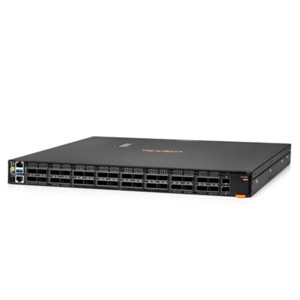There’s been plenty of marketing hype around the launch of 5G - the fifth-generation mobile network soon to supersede the current 4G network - particularly as it has almost exactly coincided with the release of 11ax (Wi-Fi 6), the newest Wi-Fi standard. Organisations looking to modernise their networks are situated at an interesting crossroads. Is 5G set to dethrone Wi-Fi as the premier solution for internal network deployments, or will the two coexist to deliver network innovation like never before?
For the last 15 years we’ve been all about the network, so you won’t be surprised that given our genuine passion for delivering robust solutions that drive ultimate performance, we ask that you be informed when it comes to 5G.
For both consumers and businesses, 5G’s promise of improving the mobile experience with faster network speeds (around 10 Gbps in ideal conditions, though only 3 Gbps has been achieved to date), lower latency and the ability to handle more simultaneous connections is tantalising. With low lag, for example, the opportunities for augmented and virtual reality systems, automation, autonomous vehicles, commercial drones, remote medical treatments, and smart homes are almost limitless. Without a doubt, 5G has the potential to transform mobile and spawn new innovations.
For now, though, it’s important not to get caught up in the hype. When 4G launched in Australia, the build-up was equally intensive with some claiming wireless would become obsolete in the face of 4G’s arrival. As it turns out, it was never the Wi-Fi killer some thought. Wireless and cellular continued to play alongside each other with wireless remaining the go-to (reliable network) for businesses the world over.
The Australian 5G rollout
Exciting launch details continue to gather steam, but this is largely coming from the US, who is racing at breakneck speed to deploy advanced 5G networks. In the first half of 2019, expect to see 5G networks launch in a handful of US cities, spearheaded by Sprint and T-Mobile, with nationwide rollouts expected by the end of the year. A little closer to home, Australia has cemented itself as a 5G world leader thanks to extensive network rollouts following years of trials. Telstra leads the local charge thanks to its 200+ 5G-enabled sites completed by the end of 2018, with Optus currently about 50 sites down on their way to the targeted 1,200 by 2020 – while some carriers have missed out entirely.
Of course, as with any new network, expect a phased and gradual rollout. Much like 11ax, vendors and Telcos have yet to deliver a significant number of devices capable of making the most of the technology, and paired with the need for updated network infrastructure, the wide adoption of 5G won’t be happening overnight. With this in mind, we wouldn’t recommend rushing out to buy a dedicated 5G device as soon as they hit the market (whether it’s a fleet of tablets or a key piece of network infrastructure) – it will be some time before you reap the rewards.
Overcoming the 5G challenges
For organisations looking to pursue the 5G advantages, there are some very real challenges to overcome, and advances yet to be made.
High frequency versus low frequency
Most critical is penetration. 5G is likely to run on a mixture of bandwidths, but it’s the higher frequency bands that allow it to deliver the much-hyped lightening speeds. In simple terms, the higher the frequency, the shorter the range, which presents an immense problem for organisations looking at indoor 5G deployments - the high frequency signals literally don’t have the strength to penetrate buildings. Building out the infrastructure to support 5G requires the installation of Distributed Antenna Systems (DAS). Cabling, small remote units, and antennas must be placed throughout a building and on the rooves with a central hub for distributing the signal to each floor. Much like a Wi-Fi install, only with greater density.
This of course means additional cost and potential complexity; a clear and costly barrier to widespread 5G adoption. Because of this, any company looking to provide reliable wireless shouldn’t be turning to 5G for their connectivity solution any time soon.
The 5G security and privacy challenge
Another key consideration of 5G adoption is security. 5G networks are designed to support a massive number of connected devices and are able to take on a huge increase in bandwidth - from the mass adoption of IoT devices and 4K videoconferencing in workplaces, to the introduction of VR and AR technology in classrooms and across campuses, or an influx of connected medical devices in the healthcare sector. The opportunities for organisations to capitalise on this new era of networking are endless.
However, with these benefits comes a fifth-generation threat landscape. As demands and the number of devices are set to exponentially increase with 5G, so too will the points of network vulnerability. A robust defence capable of identifying and addressing these increased threats – whether malicious external attacks or an unscrupulous attempt from within – needs to be top of mind for organisations looking to adopt a 5G solution. Part of this security plan must include a willingness to trust the carriers who will ultimately be facilitating the transfer of all data on your network.
Balancing performance and security are important, and it is crucial businesses get it right.
Look before you leap
Here at Matrix CNI, just as we absolutely believe that 11ax will positively transform Wi-Fi networks, we can also see the new world of possibilities that 5G is promising. But our prediction is that these benefits are still some time from true realisation. The right hardware, proactive security measures and widespread 5G device adoption able to make the most of the new connectivity all play into your organisation’s readiness to adopt 5G.
After considerable investment, the big Telcos will certainly be touting the path to 5G, but at Matrix we still see the unequivocal benefits of a robust Wi-Fi network – for control, reliability and security. If you’d like to discuss your network requirements in light of the recent 11ax launch and impending 5G release, get in touch with us today.
Matrix CNI is an Aruba Networks Platinum Authorised Reseller and has been the recipient of numerous awards, including Aruba Partner of the Year for many consecutive years, dating back to 2007.


